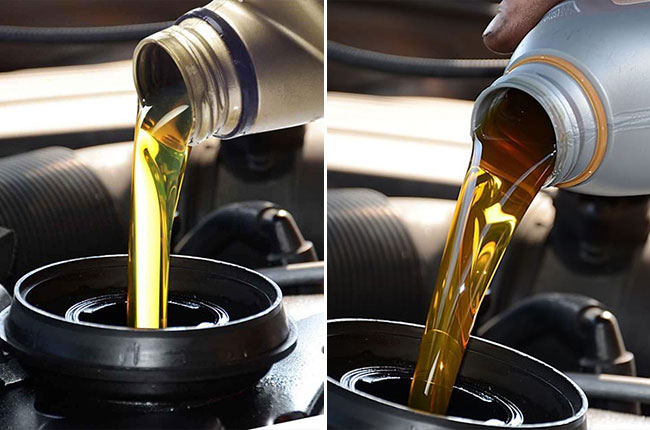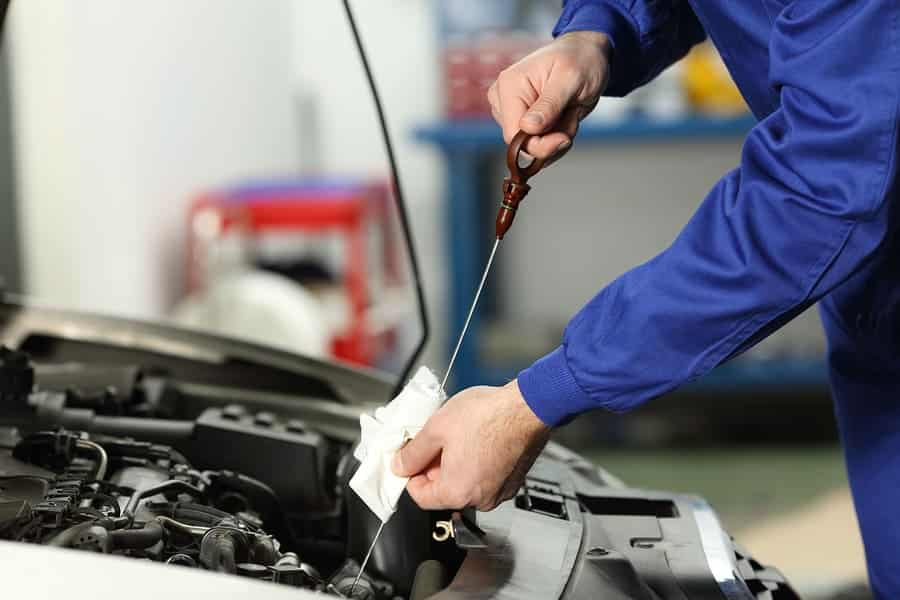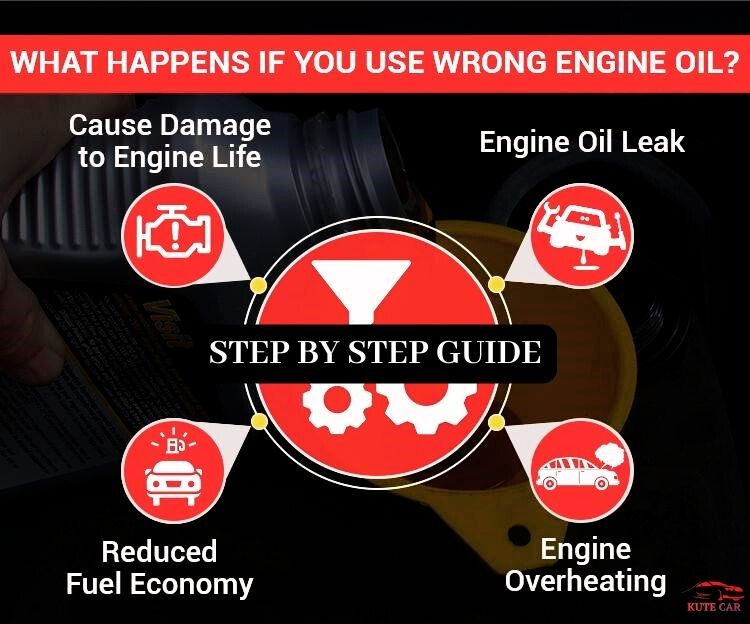What happens if you put the wrong oil in your car? This question is crucial nowadays. Regarding car maintenance, engine oil is essential, especially in ensuring the correct type of oil is used. The friction produces heat when a moving component and the parts of an engine come into contact. Ultimately, the pressure caused by friction and heat causes major components to degrade and fail. Keeping these parts lubricated with the right engine oil provides essential protection by reducing friction.
The engine oil brand you use doesn’t necessarily matter; the viscosity grade (e.g., 10W-30) is necessary. You should only use the engine oil listed in your vehicle’s owner’s manual. In other words, if the owner’s manual says to use synthetic oil, use it.
What is Engine oil?
The engine oil, which is a fluid made of petroleum oils and used to keep the part of the engines lubricating, is commonly called engine oil or engine lubricant. The main ingredients in it are base oils and additives. There are lots of moving parts in the engine that can fray and lead to friction.
Engine oil performs many functions by allowing the engine and internal components to function correctly. But it is lubrication of the vehicle’s moving parts that is most important in this machine. Furthermore, the coating and protection of movable parts, cooling, sealing, or reducing friction also have essential functions.
Importance of choosing the right type of oil for your car”
- Compatibility with engine components
- Proper lubrication of engine parts
- Minimizes friction and wear
- Enhances engine performance
- Maintains optimal fuel efficiency
- Improves engine longevity
- Maintains proper viscosity in different temperature conditions
- Helps maintain clean engine internals
- Compatible with emission control systems
What happens if you’re using lousy oil for your engine?
While the brand of engine oil you use is essential, it is less crucial than the viscosity grade. Each stage of the engine oils, each designed specifically for a particular engine type, shall be set out in separate stages 5W 30, 15W 40, 10W 30 etc.
Depending on the climate, certain viscosities might be suitable for colder temperatures whereas others have a better chance of being used at warmer temperatures. The right engine oil keeps your car running for as long as possible.
Your engine is protected and works best using the recommended conventional, synthetic, or other lubricant. That’s why it’s best to follow the manufacturer’s specifications when adding oil because bad things always happen when those specifications are ignored or ignored.
For many reasons, e.g. oil leakage, overheating, decreased fuel economy and engine damage, you must follow the instructions provided for in your owner’s manual. Details of these symptoms are provided below.
Oil leak
Using the wrong engine oil can cause oil leaks because different synthetic engine oils have other flow characteristics; You may notice a oil leak under your car or in a parking space.

Vehicles that have traveled long distances or are older from the 1960s and 1970s use thicker oils to help seal and protect the engine. Modern cars, on the other hand, are designed to use thinner oils. The leak of seals and gaskets may be caused by using Synthetic Oil instead of regular oil in Older or high-age vehicles.
It doesn’t give you the necessary lubrication and protection, if it is very thin.. Oil leaks are a mess, and you must deal with them immediately.
The engine is too hot
Overheating can occur if you do not use the oil recommended for your engine. The work of engine oil is not only to lubricate the various parts of the machine; it also helps absorb some of the heat produced by the device and ensures that no details are too hot.
Using a thicker oil contrary to the manufacturer’s recommendations can result in reduced flow and an inability of the oil to equalize the temperature. The wider the oil, the better resistance and heat generation are for the wrong application.
Burning Smell
The lower viscosity motor oils begin to fail in overheated conditions, just like higher viscosity motor oils don’t work well in the colder climate. As a result, it eventually loses its mounting strength and cannot correctly lubricate all moving parts.
Excessive friction between metal components causes the engine oil to “burn” (this explains the odor). Burning fat can also cause long-term damage to your car’s engine – a costly problem to fix!
Special Sauce for your Brakes
The brake system uses hydraulic fluid specially formulated for this purpose. Changing the transmission or power steering fluid can affect the seals, the system, and possibly the brakes. Note that your vehicle may still need brake service if the brake fluid is low. The brakes are worn or leaking.
Gear Stuck
Automatic transmissions should only use fluids specified by the car manufacturer, such as General Motors’ Dexron or Toyota’s Type T. Using the wrong fluid can lead to poor lubrication, overheating, and possibly gearbox failure. A mechanic may be unable to fix the damage, even when flushing the transmission. Adding an engine or brake fluid by mistake can also destroy your communication.
Add Washing Machine Liquid
Besides creating the perfect environment for deadly bacteria, water is not as clean as windshield washer fluid and is prone to freezing. Household glass cleaners or ammonia can leave foam on the windshield, damage the car’s paint finish, enter the air intake system, and create a potentially harmful environment in the engine.
How to Fix
The only way to fix this problem is to drain and change the damaged oil. The way to fix this problem is quite similar to your support to change the type of gas if you pour the wrong kind of gas.
Car owners use diesel instead of gasoline or vice versa more often than you think. You need to fill up the tank with new fuel and replace it with a different one before you can solve this simple error. Likewise, the wrong engine oil should be drained and replaced with the correct one.

You should also change the engine oil filter as it can contain a lot of fat. You can use an engine oil change service to ensure no residual engine oil residue in the system.
Some Additional Steps To Correct the Issue
- Potential engine damage
- Reduced lubrication effectiveness
- Increased friction and heat generation
- Formation of sludge or deposits
- Accelerated wear and tear
- Impaired engine performance
- Decreased fuel efficiency
- Risk of engine overheating
- Potential oil leaks
- Increased emissions
- Possible engine failure
- Voiding manufacturer’s warranty
- Costly repairs or replacement
Conclusion
Ultimately, you should only choose the oil viscosity recommended for your engine and driving conditions. Inappropriate engine oil can reduce vehicle performance and damage the engine. Purchasing the recommended oil costs much less than rebuilding the engine. You must always read a vehicle owner’s manual to determine the right engine oil for your car.
FAQ Regarding The What Happens if You Put the Wrong Oil in your Car?
Q.1) Can Clogging and sludge formation impact the oil in your car?
The conflicting oil can result in the clogging of oil passages and the construction of dangerous deposits that can restrict engine function.
Q.2) What should I do if I accidentally put the faulty oil in my car?
If you accidentally put the wrong oil in your car, the best thing to do is to drain and replace the oil with the correct oil and check your owner’s manual.
Q.3) What occurs if you put the wrong oil in your car?
Some potential outcomes include Decreased lubrication, Overheating, Bad engine implementation, and Raised emissions.




